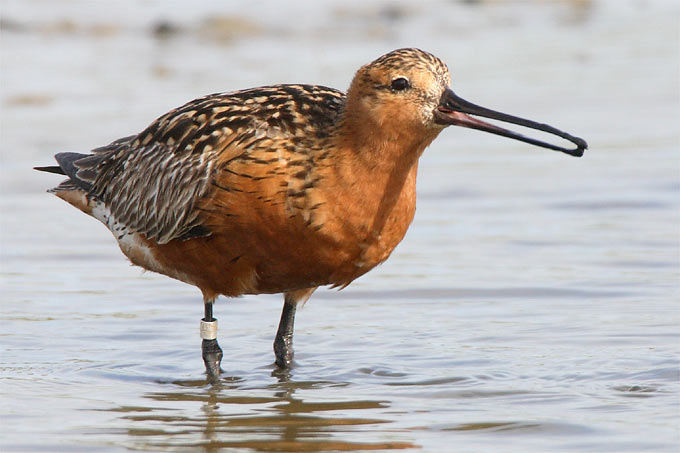Ruff, whimbrel and avocet on the decrease
New report on the status of birds in the German Wadden Sea
March 16th, 2010 – The European Wadden Sea, shared by the Netherlands, Germany and Denmark, is one of the world’s largest intertidal ecosystems. It is unique for the vast extent of its tidal flats and other natural coastal habitats – and it is of outstanding importance for millions of birds passing through on the East Atlantic Flyway or staying there to breed.
NABU, in alliance with its BirdLife partners VBN (The Netherlands) and DOF (Denmark) is strengthening its engagement in the Wadden Sea. This report serves as a basis for future strategies. It contains an analysis of the conservation and ecological status of the area, describes threats for birds, and identifies gaps in knowledge and topics for future action.
Major parts of the German Wadden Sea are designated conservation areas, but show substantial shortcomings. The influence of economic interests (fisheries, oil exploitation, waterways, tourism) on site management is still strong, and total reserves are almost completely lacking. Strategies for future coastal defence do not yet adequately consider ecological implications. Scientific knowledge is insufficient to explain bird population trends. It is therefore nearly impossible to predict the effects on bird populations of different management strategies and climate change.
Within the last 20 years, 19 out of 33 migratory bird species have decreased in number. For some species, the reasons for the declines are known, and indicate that insufficient management may well have contributed. NABU therefore intends to defend the Wadden Sea against current threats, to work towards a future Wadden Sea landscape and to form broad alliances with other stakeholders to ensure ecologically sustainable development of the region.
“Status, threats and conservation of birds in the German Wadden Sea”, 114 pp., is available from NABU Natur Shop, Am Eisenwerk 13, 30519 Hannover, Germany, Tel. +49 (0)5 11.2 15 71 11, Fax +49 (0)5 11.1 23 83 14, Info@NABU-Natur-Shop.de. Item no. 5215. Cost: 2.50 Euro per copy plus postage and packing payable by invoice.
- NABU press relaese in German
- BirdLife Partners call to save the Wadden Sea
- Download “The Wadden Sea – A vision for the conservation of a Natural Heritage”

